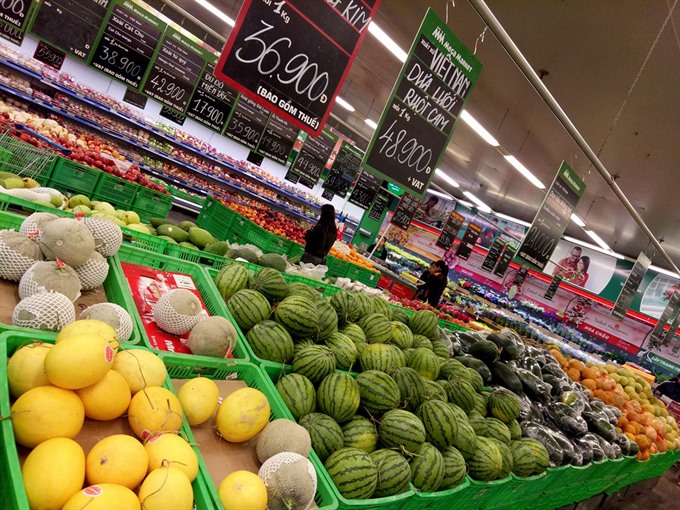The Ministry of Industry and Trade (MoIT) will enhance trade promotion programmes and give more support to businesses to increase their competitiveness in the local market in 2018.

The Ministry of Industry and Trade (MoIT) will enhance trade promotion programmes and give more support to businesses to increase their competitiveness in the local market in 2018.
Nguyen Loc An, deputy head of the ministry’s Domestic Market Department, said the economy saw positive changes last year.
The prices of energy and agricultural products saw an increase last year while those of metal items reported a decrease.
The goods market has been relatively stable thanks to cooperation among the ministries and localities, bringing down the consumer price index (CPI) to a low growth rate of 3.53 per cent for 2017, lower than the Government’s target.
The total revenue from retail sales and services reached VND3.93 quadrillion (US$174.85 billion) in 2017, surging 10.9 per cent year on year.
Tran Duy Dong, director of the department, said the country’s goods market this year would be affected by the price increase trend of materials and fuels in the world since the end of 2017.
On the other hand, abnormal changes in the weather will also have an impact on the people, agricultural production and the supply-demand of necessities. The prices of goods which are under the State management, such as electricity, healthcare and education, will continue to be adjusted according to the set roadmaps, Dong said.
He said the ministry had focussed on implementing 71 projects to develop the local market, closely linking with the movement of ‘Vietnamese give priorities to Vietnamese goods by 2020’ with an aim to promote local trade.
It will concentrate on local trade promotion activities, especially during the holidays and Tet (Lunar New Year) while launching big events with wider reach rather than small and repetitive ones.
The ministry has been implementing supply and demand connection and price stabilisation programmes to create abundant goods supply and stable prices.
The MoIT has also asked domestic businesses to establish and develop supply chains, especially in the agricultural sector.
In addition to this, it will give support to small- and medium-sized enterprises to improve their products’ quality and competitiveness. It will give solutions on market management, anti-counterfeit goods and protection of consumers’ rights.
“The ministry is collecting opinions for its strategy for local trade development by 2025 with a vision for 2035. The strategy targets a domestic trade value of VND11 quadrillion by 2025 and VND44 quadrillion by 2035,” he said.
However, it suggested that ministries should continue to follow the market changes and remain active to implement policies to control inflation.
The MoIT will try to limit the trade deficit and implement market forecasts in a better manner to have timely solutions. It will also mete out strict punishments for trade fraud and speculation activities to stabilise the local market.
Exporters turn to home yard
After achieving successes in exporting goods to foreign countries, many exporters decided to return to the local market, as they could reap greater advantages in Viet Nam’s deep integration with the world economy.
Nguyen Quang Vinh, who is in charge of the local retail sale at Duc Viet Company, told Hai Quan (Customs) newspaper that all their interior products for children had been exported to foreign markets such as the United States and the European Union.
However, in 2013, the company decided to invest in the local market, as the demand for the products in Viet Nam has been on the rise, and many foreign firms started paying attention to the market.
Duc Viet now dominates the interior product market for children in Viet Nam, thanks to the advantages of being a local firm with attractive designs, Vinh told the newspaper.
Honey and Coffee Company Limited has been exporting honey to the US and Japan for 10 years. However, Nguyen Van An, company’s director, said the local firms found it hard to build their own trademarks in the foreign markets. Most of the exported products were under foreign brand names.
So, he decided to invest in the local market four years ago. His company has invested in three plants in HCM City, Binh Duong and Dong Nai provinces.
Pham Thai Binh, director of Trung An Hi-tech Farming JSC, said that in addition to rice exports to many countries in the world, the company had started selling rice in the local market since 2015.
Binh was quoted by the newspaper as saying that with a population of more than 90 million people, the local market has been a good consumption channel. Many rice producers have paid attention to the local market as people’s awareness about clean and organic rice has improved. — VNS





